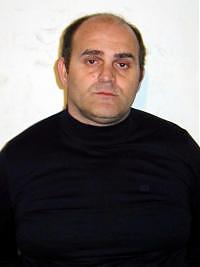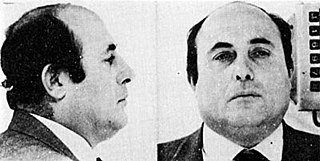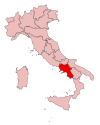The Camorra is an Italian Mafia-type criminal organization and criminal society originating in the region of Campania. It is one of the oldest and largest criminal organizations in Italy, dating to the 17th century. Unlike the pyramidal structure of the Sicilian Mafia, the Camorra's organizational structure is divided into individual groups also called "clans". Every capo or "boss" is the head of a clan, in which there may be tens or hundreds of affiliates, depending on the clan's power and structure. Consequently, as Camorra clans act independently, they are more prone to feuding among themselves. The Camorra's main businesses are drug trafficking, racketeering, counterfeiting, and money laundering. It is also not unusual for Camorra clans to infiltrate the politics of their respective areas.
The Scampia feud was a feud between the Camorra gangs in the Neapolitan quartiere of Scampia which broke out in 2004 and 2005. The fight was between the Di Lauro clan, from Secondigliano, and the so-called "secessionists", a breakaway faction in the northern suburbs of Naples that tried to assert its control over drugs and prostitution rackets in the area.
The Di Lauro clan is an Italian crime clan, part of the Camorra in Naples. The clan operates in the neighbourhoods of Secondigliano, Scampìa, Miano, Marianella, Piscinola, and in the adjacent municipalities of Casavatore, Melito, Arzano, Villaricca and Mugnano. At its peak, between the mid-1990s and the early 2000s, the organization was earning more than €500,000 a day from the sale of drugs alone, making Secondigliano the largest open-air drug market in Europe. The founder of the clan is Paolo Di Lauro, from Via Cupa dell'Arco, in Secondigliano.
Vincenzo Licciardi is the boss of the Licciardi clan, and one of the main leaders of the Secondigliano Alliance, a Camorra crime syndicate operating in Naples and the surrounding Campania region. His nickname is 'o Chiatto ("Fatso").
The Lo Russo clan was a Neapolitan Camorra clan operating on its territory within the city of Naples, concentrated specifically in the area of Miano, whose control extended throughout numerous neighborhoods in the north of the city for more than three decades. Since the fall of all the Lo Russo brothers, and the numerous arrests of most of its affiliates, the organization is considered overthrown.
The Licciardi clan is a powerful Neapolitan Camorra clan that operates in the remote areas of Naples, specifically in the Secondigliano district and its stronghold of Masseria Cardone. Its sphere of influence extends to Scampia, Chiaiano, Miano and San Pietro a Patierno.

The Vollaro clan is a Neapolitan Camorra clan operating in the area east of Naples, more specifically in the town of Portici and San Sebastiano al Vesuvio, a small village in the Vesuvius area.
The Scissionisti di Secondigliano or Amato-Pagano clan is a Camorra clan from the Secondigliano district of Naples, headed by Raffaele Amato and Cesare Pagano. They are also known as "Spagnoli" (Spaniards) because of their strong presence in Spain, particularly in Costa del Sol and Barcelona.

Raffaele Amato is an Italian Camorra boss and head of the Amato-pagano clan, a Camorra clan from Naples. He is known by multiple nicknames in the Neapolitan criminal underworld, including "Lo Spagnolo", "'o Lell", "Lell o' chiatt'" and "'a vecchiarella".

Pasquale Russo is an Italian Camorrista and boss of the Russo clan from Nola, which he co-founded. He has been running the clan together with his brother Salvatore for over thirty years. He has been on the "most wanted list" of the Italian ministry of the Interior since 1995, for Camorra association, murder, concealment of corpse, multiple homicides, racketeering and other crimes. On February 15, 1996, an international warrant was issued against him, to be arrested for extradition.
The Russo clan is a Neapolitan Camorra clan operating in the town of Nola and its surrounding territories. Police say the Russo clan had total control over illegal activity in about 40 towns in the Naples region.

Luigi Esposito, also known as Celeste ("Sky-blue"), is an Italian criminal and a member of the Neapolitan Camorra.
The Secondigliano Alliance is a strategic alliance of Camorra clans in Naples, Italy and its hinterland which controls drug trafficking and the extortion racket in many areas of Naples since the 1990s. The Alliance has branches in the Netherlands and in Spain, with interests in international drug trafficking and massive money laundering.
The De Luca Bossa clan is a Neapolitan Camorra clan operating in the eastern suburbs of Naples, and more specifically in the area of Ponticelli and in municipality of Cercola.
The Mazzarella clan is a Campanian Camorra clan operating in the city of Naples. The clan is historically considered one of the most powerful groups of the Camorra.
The Polverino clan is a Neapolitan Camorra clan operating in the town of Marano di Napoli. The clan is present also in Villaricca, Quarto, Pozzuoli, Qualiano and in the district Camaldoli of Naples. Outside Italy, the clan has a strong presence in Spain, in particular in Barcelona, Málaga and Alicante. According to the investigations, the Polverinos are considered the successors of the Nuvoletta clan.
The Rinaldi clan is a Camorra clan operating in the area of San Giovanni a Teduccio, in the eastern area of the city of Naples. Since 2019 the clan has formed an alliance with the Ponticelli's De Luca Bossa clan, and Barra's Aprea-Cuccaro clan, called by the media Rinaldi-De Luca Bossa-Aprea, which has emerged as the most powerful Camorra group in the eastern region of Naples.
The Aprea-Cuccaro clan is a Camorra clan operating in the area of Barra, in the city of Naples.





